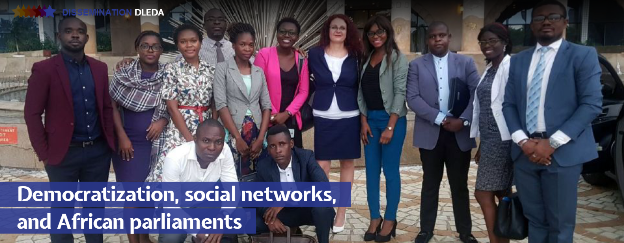
Field research in Gabon: Democratization, social networks, and African parliaments
A field study for the DLEDA project is currently being carried out in Gabon: A new article in the second edition of The Project Repository Journal (PRj) reports about it.
Political science has developed a number of theories to explain the cross-national variation in the quality of democracy. Some link the outcomes of political transitions to structural factors like wealth, urbanisation, education, or a favourable international environment. Others look at the strategic behaviour of actors like political elites or protest movements, or the role of political institutions. These theories are not necessarily mutually exclusive. While our project is interested in the role of parliaments as political institutions, we study these institutions through an actorcentric approach: who are the members of parliament, how do they interact with each other, and how do they fulfil their function of representating the electorate?
Democracy itself can be viewed as a system that resolves conflicts between groups of actors in non-violent ways. Parliaments provide an arena in which the pacification of political struggles takes place in the daily interactions between Members of Parliament (MPs). To make this effective, parliaments must, however, represent the demographic composition of the population. Moreover, legislators should provide an active link between the interests of the population and the political system. Reality often falls short of these ideals, and this is something that we are trying to understand: does legislative behaviour vary systematically with the level of democracy in a country? Are parliaments in democracies more representative than their counterparts in less democratic countries? To answer these questions, we conduct surveys in the national assemblies of Benin, Botswana, Cameroon, Gabon, Tanzania, Togo, and Zimbabwe.
Our first data collection takes place from June 2019 onwards in Gabon. The goal is to interview all 133 members of the National Assembly in face-toface interviews using a standardised questionnaire. The questionnaire contains three blocks of questions. Firstly, we collect data on the biographies and career patterns of the MPs. Core characteristics like ethnic origin, religious conviction or education will allow us to assess the level of demographic representation. The next block of questions uses different versions of name generators to measure social interactions within the parliament. The data will shed light on the extent of conflict and cooperation between the different groups represented in parliament. Moreover, we include questions on intra-party networks and relations to civil society groups. The last block of the questionnaire is devoted to the values and attitudes of the MPs. On the one hand, we want to understand the feedback mechanisms between representatives and their voters; for example, how often they travel to their home constituencies, or how voters can contact them. There is also a set of questions on campaign organisation and financing, as well as the self-conception of MPs.
Much of this data is sensitive and, being categorised as personal data, must be treated with extreme care. Also, political elites are a very special target group to be interviewed. They often have little time and are sometimes suspicious of political research. Getting into contact is also more difficult than with other target groups. Therefore, our team had to invest in trust-building with the parliamentary leadership to get an authorisation for the survey, and with the staff for logistical help. To conduct the interviews, we employed ten research assistants, most of them being master's students at the Omar Bongo University in Libreville. Before being deployed to the field, they underwent an extensive training in all aspects of the survey: data security, informed consent procedures, guidelines for elite interviews, handling of the tablet computers, and risk management. The whole team benefited immensely from the interview simulations that we ran. These helped to refine the questionnaire and adapt it to the local situation. After the first days in the field, we organised a feedback meeting to discuss difficulties and possible challenges. In general, our research assistants were well received and the respondents were cooperative.
For our project, the ongoing case study in Gabon plays a pioneering role and will set an example for the remaining six countries. The country study is directed by the PI Dr Anja Osei (University of Konstanz, Germany), Hervé Akinocho (Center for Research and Opinion Polls, Togo), and Dr Christian Wali Wali (Centre d’Etudes et de Recherche en Géosciences Politique et Prospective, Université Omar Bongo, Gabon).
Read the full second edition of The Project Repository Journal (PRj) here.
More information about PRj and previous editions can be found here.
The pdf version of Dr. Anja Oseis article in PRj can be seen here.
